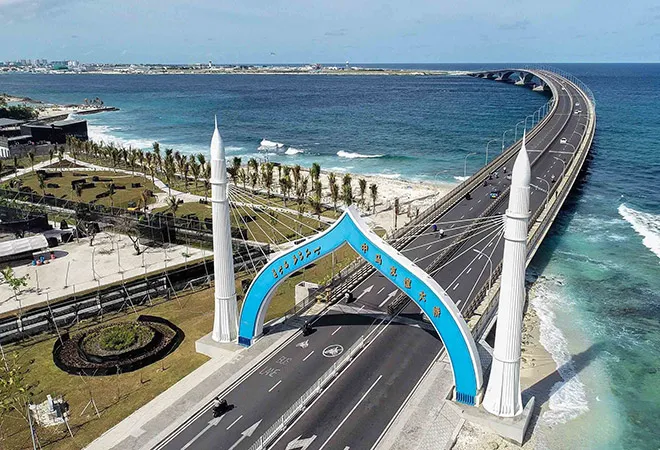
Ever since China expanded its engagements in the Indian Ocean beginning in 2008, Beijing has recognised the strategic value of the Maldives. This stems from Maldives’ geographical
positioning near crucial sea lanes that are important for China's energy supplies. Thus, to consolidate its influence over the island nation, China has been leveraging its economic largesse to court successive Maldivian administrations.
Notably, former President Yameen Abdul Gayoom’s administration (November 2013-November 2018) was particularly open to Beijing’s outreach, pivoting away from Malé’s historical reliance on India and drawing
closer to China instead. This shift was viewed unfavourably by New Delhi, as it was keen on preserving its regional sway and was apprehensive that China is deliberately using its economic clout to enlist India’s neighbours into a '‘string of pearls’ encircling the subcontinent.
China's robust economic ties with the Maldives, cultivated over a decade, have stayed resilient, ensuring that Beijing remains well-positioned to patiently advance its strategic objectives in Malé.
Given this context, when President Ibrahim Solih, who champions an
‘India First’ foreign policy, was elected in 2018, it was widely interpreted as a
loss for China and a victory for India. However, it is becoming apparent that this narrative was overstated. China's robust economic ties with the Maldives, cultivated over a decade, have stayed resilient, ensuring that Beijing remains well-positioned to patiently advance its strategic objectives in Malé.
Beijing’s new horizons
China is currently expanding its reach into the Indian Ocean with pronounced vigour. Current leader Xi Jinping has made the Indian Ocean central to the Maritime Silk Route (MSR) project— a branch of his signature
Belt and Road Initiative (BRI) which commits over a trillion dollars to infrastructure projects across Eurasia and Africa. He established China’s first overseas base in
Djibouti in 2017. Furthermore, he is committed to strengthening strategic relations with the
Indian Ocean’s island nations such as the Seychelles, Mauritius, Sri Lanka, and the Maldives.
In the Maldives,
China inaugurated its embassy in 2011 during a politically tumultuous period that culminated in the
forced resignation of President Mohamed Nasheed, in 2012. It was during this
decline in the traditionally strong relations between New Delhi and Malé, China began to expand its commercial presence in Maldives.
Beijing’s efforts in this regard gained strong traction under the administration of Abdulla Yameen Abdul Gayoom, who was
elected president in 2013 and was particularly amenable to Beijing’s commercial overtures. Two factors motivated Yameen's partnership with Beijing. First,
Beijing was willing to overlook the authoritarian tendencies of his administration, for example,
China warned India not to interfere in the Maldives’ domestic politics when New Delhi
expressed concern regarding Yameen’s decision to declare a
State of Emergency in February 2018 in defiance of a Supreme Court order to release political prisoners.
Beijing’s efforts in this regard gained strong traction under the administration of Abdulla Yameen Abdul Gayoom, who was elected president in 2013 and was particularly amenable to Beijing’s commercial overtures.
The second factor, which preceded his presidency, was the Maldives’ 2011
graduation from Least Developed Country (LDC) status. This led to a need for bilateral commercial funding for infrastructure, as international aid was no longer an option. Thus in 2014, Yameen committed to the BRI, paving the way for Chinese enterprises to fund significant infrastructure projects in Maldives, such as the
China-Maldives Friendship Bridge.
Moreover, Yameen sought to establish a Free Trade Agreement (FTA) with China in 2017 to enhance trade and market access for Maldivian fish exports. This move, much to
India’s distress over China’s growing commercial influence over its southern neighbour, was pushed through a sparsely attended parliament bypassing proper
legislative scrutiny. Despite these hurried efforts, he failed to ratify the agreement before his successor, Ibrahim Solih, took office following the 2018 elections.
Solih, to date has not ratified the FTA with China, prompting ongoing
complaints by China’s current Ambassador to Maldives. At first glance, Beijing's desire for an FTA with Malé might seem puzzling given the huge disparity between their economies: Maldives' GDP stands at US$
5 billion, in contrast to
China's staggering US$ 17 trillion. Additionally, the Maldives' population of less than half a million hardly offers a substantial export market. However, such an agreement would give China substantial commercial influence over this strategically situated island nation.
The cost of business
China frequently faces allegations that it uses economic coercion to advance its broader objectives. This viewpoint, frequently articulated by the Maldives' former President and current Speaker of Parliament,
Mohamed Nasheed, suggests that China seeks to commercially dominate countries it engages in business with, often ensnaring them in unsustainable debt to secure strategic assets via ‘debt for equity’ swaps. The leasing of Sri Lanka’s
Hambantota Port to Beijing for 99 years is commonly cited as evidence of this strategy.
While
critics argue that such narratives overlook the countries' own economic missteps, unfairly shifting blame onto China, a recurring pattern of Beijing using commercial influence to reach geopolitical objectives is evident. This pattern is not only visible in Small Island Developing States in the Indian Ocean, such as the Maldives and Sri Lanka but also across the wider Indo-Pacific region, including countries with relatively large and advanced economies.
The China-Australia relationship serves as a prime example. Under the administration of Malcolm Turnbull, Australia grew wary of Beijing’s increasingly
audacious attempts to influence its politicians on key issues such as the South China Sea disputes. For instance, in 2017, Sam Dastyari, an Australian Labour Party politician,
was forced to leave parliament in disgrace after it was revealed that he had sided with Beijing in its maritime disputes, after accepting money from Chinese benefactors.
The ability and willingness of China to use such commercial leverage over a Western middle power and key U.S. Indo-Pacific ally should serve as a stark warning to the Maldives, a microstate far more vulnerable to commercial manipulation.
As Canberra enacted
legislation to counter foreign influence and the subsequent Scott Morrison administration
banned Huawei from rolling out 5G networks in Australia, relations further soured. Beijing retaliated by
imposing tariffs on Australian exports, posing a threat to Australia’s economy, which is heavily dependent on trade with China. The ability and willingness of China to use such commercial leverage over a Western middle power and key U.S. Indo-Pacific ally should serve as a stark warning to the Maldives, a microstate far more vulnerable to commercial manipulation.
Yet, under former President Yameen's leadership, the Maldives' debt to China soared to
one-fifth of the country's GDP, and China became a critical source of tourism,
a sector crucial to the Maldivian economy. It is important to note that China, which only permits its nationals to visit countries with Approved Destination Status (ADS), rigidly controls its outbound tourism as a form of economic leverage—for instance issuing a punitive travel advisory against the Philippines in 2014,
in response to territorial disputes.
Moreover, despite initial predictions, Beijing’s ties with the Maldives have remained firm under the current administration. This strengthening relationship has weathered
initial pledges to reevaluate trade agreements with China established under the Yameen administration, as well as India's attempts to reduce the Maldives' economic reliance on China, including efforts to
alleviate Maldivian debt to Beijing.
Enduring influence
China’s enduring interest in the Maldives was evident in the timing of then-Foreign Minister Wang Yi's visit to Malé in January 2022.
Consistent with tradition, Beijing had begun its diplomatic year with a ministerial tour of Africa, symbolising China’s commitment to cultivating ties with the continent. Extending his itinerary to include Comoros, Sri Lanka, and the Maldives immediately after his African tour, he signalled China's resolve to strengthen its relationships with the
island nations of the Indian Ocean.
As projects led by India, such as the Greater Malé Connectivity Project, progress slowly, the allure of China's rapid infrastructure support could grow.
During Wang Yi’s visit to the Maldives, the two counties inked several agreements aimed at
boosting cooperation across various domains. Much of this cooperation was simply to expand the scope of the ongoing collaboration with China. This includes
housing projects, upgrades to
Velana International Airport, and the recent renovation of the
Ministry of Foreign Affairs’ building. Further, as projects led by India, such as the Greater Malé Connectivity Project, progress
slowly, the allure of China's rapid infrastructure support could grow. This is particularly relevant in an election year, as substantial infrastructure investment is a widely used political strategy in the Maldives.
The main contrast between the previous and current administrations in Malé is the latter's reticence to sign an FTA with China—a hesitation that may be overcome after the forthcoming
September elections. In fact, given the existing momentum of Beijing's commercial interactions with the Maldives, China might not have to wait for a more favourable shift in the Maldivian administration to fulfil its ambitions. Owing to its deeply entrenched commercial influence in the Maldives, Beijing already remains well-positioned to capitalise on this involvement as a strategic lever whenever it suits their interests.
Mimrah Abdul Ghafoor is a Maldivian expert who served as a speechwriter and later as the lead speechwriter at the Office of the President of the 76th Session of the United Nations General Assembly
The views expressed above belong to the author(s). ORF research and analyses now available on Telegram! Click here to access our curated content — blogs, longforms and interviews.



 Ever since China expanded its engagements in the Indian Ocean beginning in 2008, Beijing has recognised the strategic value of the Maldives. This stems from Maldives’ geographical
Ever since China expanded its engagements in the Indian Ocean beginning in 2008, Beijing has recognised the strategic value of the Maldives. This stems from Maldives’ geographical  PREV
PREV


